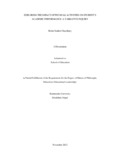
Please use this identifier to cite or link to this item:
https://hdl.handle.net/20.500.14301/453| Title: | Exploring the Impact of Physical Activities on Student’s Academic Performance: A Narrative Inquiry |
| Authors: | Chaudhary, Binita Sunder |
| Citation: | Chaudhary,B.S.(2023).Exploring the impact of physical activities on student’s academic performance: A narrative inquiry |
| Issue Date: | Nov-2023 |
| Publisher: | Kathmandu University School of Education |
| School: | SOED |
| Department: | DOEL |
| Level: | M.Phil. |
| Program: | MPhil in Educational Leadership |
| Abstract: | There is a growing body of literature about the relationship between physical activities and academic performance in education. My experience and the review of related literature observed a lack of research on physical activities being the resource for better academic performance in students. To address this gap, I carried out this study. I used the paradigm of interpretivism and conducted a narrative inquiry to explore the students’ experiences and their discernments regarding the influence of physical activities on their academic performance. Using the lens of social constructivist theory and self-determination theory, I explored the stories of four participants (students and teacher) from a school in the Lalitpur district, gathering and analyzing the personal narrative of students who actively engaged in physical activities during their academic pursuits. They explained how their participation in physical activities improved their learning abilities and academic performance. The study found that physical activity is crucial for maintaining a healthy lifestyle and can potentially boost student's cognitive functioning and academic performance. Acknowledging the comprehensive advantages of physical activity becomes increasingly indispensable as our society struggles more with health and academic issues. Several recurring themes were discovered through a careful analysis of the collected narratives. Participants frequently repeated enhanced concentration, improved analytical skills, developed problem-solving skills, and increased overall well-being as outcomes of their participation in physical activities. The results of this study shed light on the impending benefits of incorporating physical activities into the daily routines of students and putting them into practice. The improved cognitive and emotional well-being reported by participants serves as a reminder of how important it is for educational institutions to take students' overall development. These findings necessitate reevaluating educational policies to prioritize integrating physical activities within the academic curriculum. |
| URI: | https://hdl.handle.net/20.500.14301/453 |
| Appears in Collections: | Dissertation |
Files in This Item:
| File | Description | Size | Format | |
|---|---|---|---|---|
| Final Dissertation-BINITA.pdf | 1.98 MB | Adobe PDF |  View/Open |
Items in DSpace are protected by copyright, with all rights reserved, unless otherwise indicated.